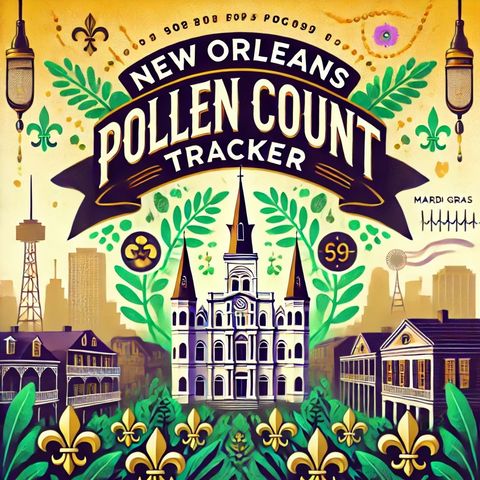Pollen Count for New Orleans, LA on 11-20-2024

Download and listen anywhere
Download your favorite episodes and enjoy them, wherever you are! Sign up or log in now to access offline listening.
Pollen Count for New Orleans, LA on 11-20-2024
This is an automatically generated transcript. Please note that complete accuracy is not guaranteed.
Description
In New Orleans, Louisiana, residents often keep a keen eye on the pollen count, especially during transitional seasons when allergy symptoms can flare up. Today, on November 20, 2024, the...
show moreThe primary contributors to pollen counts at this time of year in New Orleans are typically ragweed, grasses, and mold spores. November generally marks the tail end of the ragweed pollen season, but due to the region's warm and humid climate, elevated levels may persist later in the year compared to more northern areas. Grass pollen is usually lower in late autumn but can still be present, especially after rainy periods that promote growth. Mold spores, on the other hand, thrive in humid conditions and can be particularly bothersome year-round.
Today's moderate pollen count means that sensitive individuals might experience mild allergy symptoms. These can include sneezing, itchy or watery eyes, nasal congestion, and potentially exacerbated asthma symptoms for those affected. While a moderate count is not as severe as high or very high levels, it is enough to cause discomfort for those with pollen sensitivities.
Weather conditions play a significant role in daily pollen levels. For November 20, 2024, New Orleans is experiencing mild weather with temperatures ranging from the mid-60s to low 70s Fahrenheit. This sort of climate can encourage pollen release, especially on dry and windy days. However, the forecast suggests a chance of scattered showers, which could help reduce airborne pollen by dampening and washing it away. Additionally, humidity levels are expected to be high, consistent with New Orleans' subtropical climate, which can also impact pollen dispersion.
For local residents looking to mitigate allergy symptoms, it is advisable to take preventive steps. These might include staying indoors during peak pollen times, generally morning and early evening, keeping windows closed to prevent pollen from entering homes, and maintaining your air conditioning system with clean filters. For outdoor activities, wearing a mask or pollen filter can also be beneficial.
While today's pollen count is manageable, those with severe allergies may want to consult healthcare professionals for advice tailored to their specific needs. Over-the-counter antihistamines or nasal sprays can also provide relief for many symptoms. It's prudent for residents, especially those with known allergies, to monitor local weather and pollen forecasts continuously to stay prepared.
In summary, while New Orleans typically enjoys a diverse and pleasant climate, November can still pose challenges for those sensitive to pollen. By being informed and taking proactive steps, locals can enjoy their daily activities with minimal disruption due to allergies.
Information
| Author | QP-5 |
| Organization | William Corbin |
| Website | - |
| Tags |
Copyright 2024 - Spreaker Inc. an iHeartMedia Company

Comments